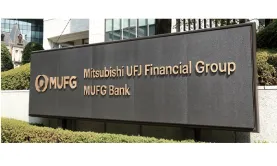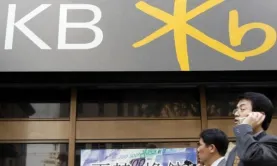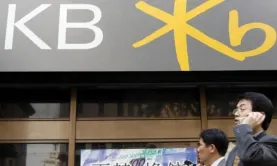Korea
Chart of the Week: How many branches do Korean banks have left?
Chart of the Week: How many branches do Korean banks have left?
The number fell from as high as over 7,500 in 2014.
Korea's virtual banks still struggle to find footing
Lenders grapple with low profitability and limited capital two years since they kicked off. After two years since their debut, Korean virtual lenders Kakao Bank and K Bank have managed to capture just 0.6% of the KRW-denominated loans market as of end 2018, according to a report by Moody’s with data from the Financial Supervisory Service (FSS). The lenders have been the most active in the unsecured personal loan market with plans to extend to retail loan segments like mortgages. “Korea’s two virtual banks have brought modest competition in some retail loan segments but no broad disruption in the two years they have been operating,” the report said. To jockey for market share, the ratings agency noted that K bank has a loan portfolio geared toward non-prime borrowers or individuals with credit rating less than four out of 10, pushing its delinquency rate above the regional banks. Meanwhile, Kakao Bank, with a higher portion of prime borrowers, has shown better asset quality compared to its commercial bank peers. Kakao Bank has focused its lending business on prime borrowers, and its proportion of loans with lending rates of less than 4% was at around 82% of total newly extended loans in May 2019. “Virtual banks have not yet shown competitive advantages in using proprietary data sources for underwriting. We expect asset quality of the virtual banks will reflect on the risk undertaken in terms of the proportion of high risk borrowers,” Moody’s said.
Korean regional banks look to SEA for growth
DGB Financial Group is aiming to open a bank branch in Vietnam. Regional lenders in Korea are betting on Southeast Asia for expansion amidst a saturated domestic market, reports The Korea Times. Daegu-headquartered DGB Financial Group revealed plans to open a bank branch in Vietnam after applying for license. A spokesman from the bank noted that DGB Daegu Bank acquired Cambodia's Cam Capital Specialised Bank in 2018 whilst DGB Capital launched DGB Laos Leasing Company in 2016. "We are looking for opportunities in Vietnam as Shinhan Bank did there. There are a lot of cultural similarities between Korea and Vietnam. This is one of the reasons we are seeking to launch services there," a DGB spokesman said. Also read: Foreign banks flock to Vietnam
Korean banks step up game to lure baby boomers
KEB Hana will create a taskforce to focus on premium pension products.
Korea banks on big data infrastructure
It will create a financial data exchange for financial players in the country.
Tougher mortgage rules await smaller Korean banks
The scheme is an attempt to help stabilise home prices. Korean second-tier banks will be subject to more stringent mortgage rules called Debt Service Ratio (DSR) by June, reports Yonhap. The move is an attempt from authorities to dent the growth of household debt and stabilise home prices.
Korea rejects two web-only bank applicants
It cited lack of innovation and concerns over governance and financing.
Korea trials drive-thru banking in fintech sandbox
Woori Bank aims to make the service available in restaurants and car parks near the airports.
Unlicensed investment banks cash in on Korea's bond issuance spree
They earn more than $17.6m in fee income annually without being required to pay taxes.
KEB Hana kicks off mobile banking service in Vietnam
It will allow immediate cash wiring through a one-time passcode upon user's request.
Korean virtual banks succumb to net losses for two straight years
K Bank and Kakao Bank saw a combined net loss of $78m in 2018.
Korean banks urged to break heavy reliance on interest income
Non-interest related earnings made up 12% of 2018 profits.
Shinhan Financial Group pledges $40.52b in corporate loans by 2023
The group is also aiming to increase VC fund to $123.32m.
Three's a crowd: Shinhan and fintech unicorn Viva Republica leap into Korea's internet-only banking race
The partnership will have immediate access to 11 million users of e-payment app Toss.
Korean banks' foreign branches profit up 22% to $983m in 2018
Net income from Hong Kong, China and Vietnam rose sharply.
HSBC targets Korean bank tie-ups for blockchain platform
It aims to launch the Voltron platform to rapidly streamline trade financing.
Korean banks' employee numbers drop 9.2% in 2018
The rise of mobile and online banking meant less branch staff.















 Advertise
Advertise

















Commentary
Asia’s banks hold the mandate to innovate. Now they must earn it.
Why Asia's banks are rebuilding their credit infrastructure in 2026
Banks retreat, private credit advances: Asia Pacific’s quiet lending revolution
Human Sparsity Blockchain: A citizen-validated ledger for digital finance supervision
Will stablecoins disrupt the banking business?
Digital transformation starts with leadership